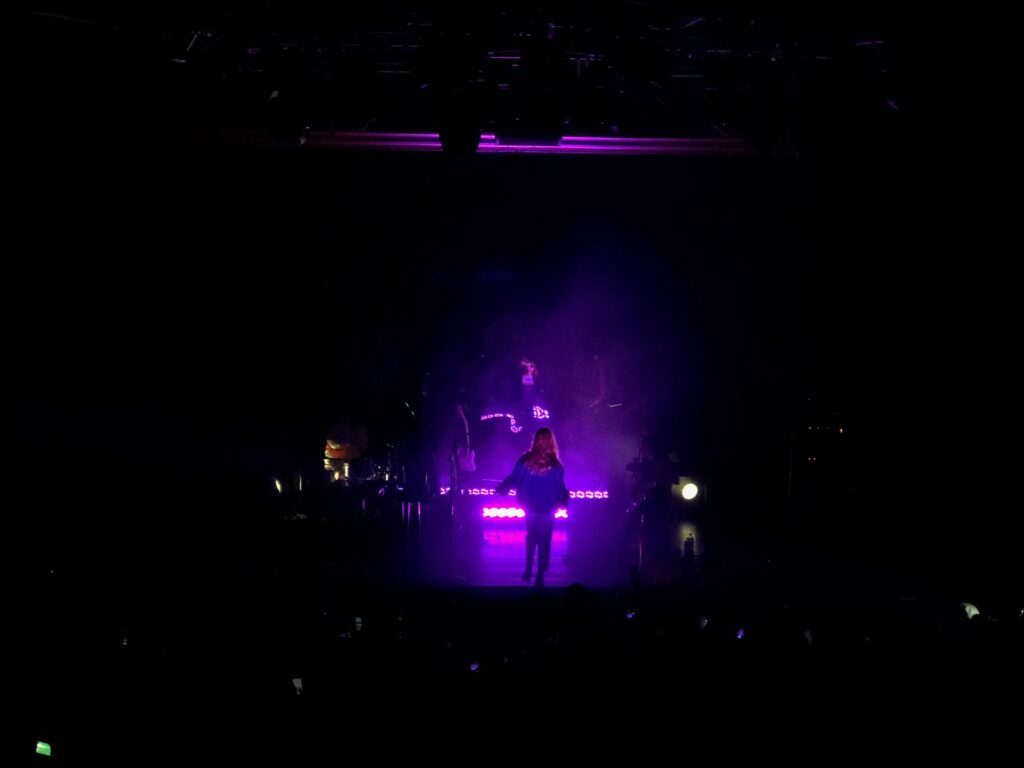It starts with a screen. But before that, a bedroom. Scotch-taped posters plastered on the walls and a thumbtacked string of lights; the familiar objects of Claire Cottril’s space which would soon be recorded and uploaded online as the minimal setting for her spur-of-the-moment music video, “Pretty Girl.” Almost twenty million views later, those posters, along with Cottril herself, have become the face of “bedroom pop,” a loose genre of DIY music, more often than not confused for an aesthetic or sound rather than having been recorded in an actual bedroom. It’s this muddled definition of the term, recently popularized by a Spotify playlist, that has led to controversy over the integrity of the genre, the state of DIY music and what “making it” means. Nowhere better is this seen than in Cottril’s rise to fame as Clairo.
On a summer evening, the sky still light out, a mass of suburban teenagers waited patiently in line outside The Santa Ana Observatory. Most on their phone, others talking amongst themselves, waiting for a show that had been sold-out days in advance, much to the surprise of the headliner, Clairo, who recorded the crowd on her phone as she waited inside.
“I’m still a little bit in shock,” Clairo would say half-way through her performance to an audience of screaming teenagers.
It’s not hard to see where Clairo is coming from. The “Pretty Girl” music video was posted in just August of 2017 and her EP was released this past May. Though her career was born online, even it has moved fasted than expected in the digital age. And along with her insane growth in popularity has arisen the questions of why.
Industry-plant, family connections and plagiarism have been tossed around as answers. Her sincere, self-made image that young fans have flocked to has been under constant examination, her climb to success seen as the result of a false narrative of humble origins. For as fast as Clairo has risen, many have leaped at the chance to tear her down and expose who she really is.
But none of this was present as fans filled into the pit as soon as the venue doors opened. The Clairo controversy conversation occurs almost entirely online, on the outskirts of the overflowing good press that revolves around Clairo and fellow bedroom pop stars such as Cuco and Gus Dapperton. Because the naysayers can’t be heard over the millions of fans online, nor the hundreds of fans that night chanting “Clairo.”

Despite all this, Clairo seems removed from it all. She’s shy, never staying in one place on stage, constantly moving away from the spotlight, throwing on a pair of sunglasses and facing her back to the audience. The stage isn’t the screen, and Clairo is still adjusting to being seen. Along with a live band, a giant mirror occupied the stage, reflecting the illuminated faces of those at the barricade; a shrine to the modern age. As seen in Clairo’s career, teenage insecurity and fame have coincided, and this time, through social media, everyone’s on stage.
Bedroom pop seems to be both born out of this and hindered by it. Because now, anyone can make music from their bedroom. Now, anyone can make it. The bedroom has become the stage. And with that, an influx of artists veiled in a cloak of realness, promising to deliver music from the heart untouched by the hands of the music industry.
But where is the line drawn? Can bedroom pop expand into the studio without losing its authenticity? Or is its authenticity merely a commodity, a means of classifying itself amongst other similar-sounding genres? It seems to be that bedroom pop has become a catchall term for music that sounds honest, or at least has been labeled that way. What falls through the cracks is the actual process and what it means to make “authentic” music today.
None of that seemed to matter in the midst of it all, though, as Clairo walked around the stage with a microphone, holding it to the audience during the chorus of “Flaming Hot Cheetos.” The crowd of teenagers on summer break was much too concerned with capturing the moment, seeing Clairo’s image held within their tiny screens, than concerning over where her music is made; they’re just happy she’s left her bedroom to perform onstage.

But where Clairo will go next remains unknown to the audience who catapulted her to where she is today. As she, along with other bedroom pop acts, continues to grow a devoted community of followers, the term bedroom pop becomes all the more cramped. Because recording in one’s bedroom, in one’s private space, has always been the first steps, never permanent. What happens when they outgrow the bedroom? What happens to the authenticity? For now, they’re safe to stay, but sooner or later, the pressures of moving out, of moving on, will arise, and the question of abandoning bedroom pop’s label will have to be answered. And if it’s abandoned, was it ever the right fit to begin with? Or just a trendy marketing ploy, authenticity packaged and sold, a lie disguised as the truth, just another product of 2018?
